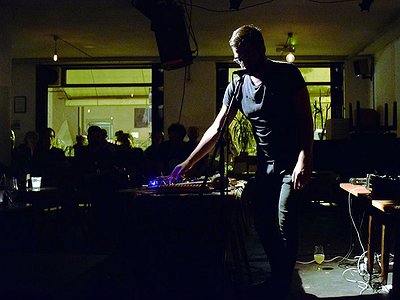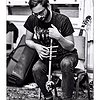Part 2
With more and more musicians creating than ever and more and more of these creations being released, what does this mean for you as an artist in terms of originality? What are some of the areas where you currently see the greatest potential for originality and who are some of the artists and communities that you find inspiring in this regard?
Originality is a thankless and stressful goal to aim towards. My music and sound will be comparable to others; it may even steal from others’ work but I am always interested to hear comparisons from audiences and listeners.
I know what I feel passionate about and enthused by and I will continue to seek it out. I also feel inspired by seeing my peers perform and going down the rabbit holes of blogs and YouTube in search of new sounds from around the world.
How strictly do you separate improvising and composing?
That’s a tricky one. For me they overlap. I can spend a long time improvising and often I find a segment or motif that sticks and this can then inform a composition. However, when improvising live (either solo or with others) I find my headspace to be very different. I am responding to the moment - the sounds, the space, my emotions and my playing with another person or group. Improvising with others is as liberating as much as it’s testing and satisfying.
How do you see the relationship between sound, space and composition and what are some of your strategies and approaches of working with them?
Space is not something I consider a great deal when composing as I’m often so restricted. Space when performing live is very important practically in terms of size, acoustics and the equipment but also to the nature of the event and performance. I’ve learnt to be flexible in this way. However, making time for composing to happen is also important. Setting aside afternoons, weekends or weeks to record or compose can be very fruitful.
What's your perspective on the relationship between music and other forms of art – painting, video art and cinema, for example – and for you and your work, how does music relate to other senses than hearing alone?
I feel inspired by visual art but it’s not something I consider much of in my work. I enjoy the abstract nature of experimental music and sound art - I also spend a lot of time listening and I like to think this has allowed me to create new works as I have a vested interested in it.
I love listening and the power it can have on myself and audiences - it’s a skill that is hard to describe at times but has the potential to be emotive and transformative. I have recently started creating my own artwork for releases, in an attempt to be more self-sufficient. I’ve really enjoyed playing with collages, particularly of kolam patterns, basic shapes and human and non-human animal bodies.
What's your view on the role and function of music as well as the (e.g. political/social/creative) tasks of artists today - and how do you try to meet these goals in your work?
I don’t believe what I do is overtly political, in most cases. I am a politically vocal (and at times, active) person but it’s not something I’ve explored in my solo work. Art and creativity can be a great healer and distraction from the ills of the world and can also form solidarity between like-minded people. I am deeply passionate about animal advocacy and since 2013 I’ve been finding ways to explore some of the issues around human and non-human animal relationships in my work but I still have trouble with not wanting to create propaganda but give light to the ideals of animal advocacy. I admire and adore those that use their creativity for a tool of change or those artists who have created work in particularly oppressive or intolerant regimes and societies. Punk and folk music has a great way of doing this, but so has grime recently and I’m sure it will continue to do so in a myriad of ways.
Listening is also an active, rather than just a passive process. How do you see the role of the listener in the musical communication process?
It’s massively important. Whether I’m receiving feedback or suggestions on my compositions, to writers’ opinions or the opinions, thoughts or feelings of audiences - I listen to them all. I may not agree with them all but I am still honoured that people take the time to listen and respond to what I do.
Reaching audiences usually involves reaching out to the press and possibly working with a PR company. What's your perspective on the promo system? In which way do music journalism and PR companies change the way music is perceived by the public?
I find it really difficult. I am on a slow, difficult path of finding ways of exposing my creativity to wider audiences. The unwritten rules of what to say and not say I find tricky. I also hate ‘networking’ and the feeling that interactions with some people are just based on you promoting your work to one another. I worry enough about myself and my work and being in a situation where that’s all your supposed to promote I find increases my anxiety. However, I am really happy and honoured when people show a genuine interest in what I do - be it out of passion or a willingness to support me. I am still getting used to the slight knock-backs but I know I’ll carry on creating and performing regardless of these.
Do you have a musical vision that you haven't been able to realise for technical or financial reasons – or an idea of what music itself could be beyond its current form?
I often have grand ideas of what I’d like to do! I hope that with the right people, time, space and funding I can do these things. Some of these things are happening though. I want to combine my research into combining animal sounds, electronic instruments, field recordings and non-western music styles into more recordings and performances.






